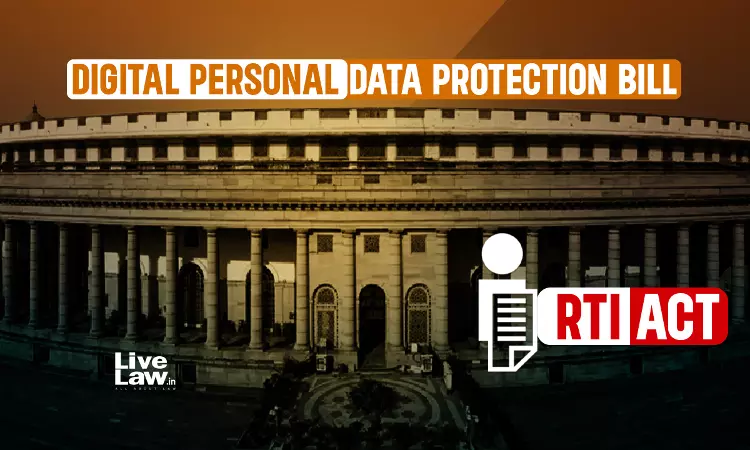'Denying Information Under The Guise Of Data Protection' : Concerns Raised About Digital Personal Data Protection Bill Amending RTI Act
Aiman J. Chishti
10 Aug 2023 2:38 PM IST

The Parliament passed the Digital Personal Data Protection Bill on Wednesday. The Bill seeks to provide protection to “personal data” and has provision to process it for “lawful purposes.”
However, a significant change that the Bill has introduced is an exemption to provide personal information under Right To Information Act (RTI).
Section 44 (3) of the Bill amends Section 8 (1)(j) of the RTI Act, which will have the effect of totally exempting personal information from disclosure.
Section 8 (1)(j) of the RTI Act states that information which relates to personal information will be exempted from RTI Act, if its disclosure has no relationship to any public activity or interest or if it would cause unwarranted invasion of the privacy of the individual. However, a Public Information Officer can direct the disclosure of such personal information if the authority is satisfied that "the larger public interest justifies the disclosure of such information".
Also, the proviso to Section 8 (1)(j) states that personal information which cannot be denied to the Parliament or the State Legislature cannot be denied to an RTI applicant.
According to the amendment, In section 8 of the Right to Information Act, 2005, in sub-section (1), for clause (j), the following clause shall be substituted, namely:—
“(j) information which relates to personal information;”
This clearly means that now a person cannot seek any information under RTI related to “personal information” even if it has a relationship to any “public activity” or “interest.” The amendment also takes away the proviso to the Section 8 (1)(j).
After the amendment, a person seeking information through RTI related to any official document can also fall into the definition of “personal information” and in turn he can be denied any significant information of public interest.
This is because the wide definition given to “person” in the Bill includes, “(i) an individual; (ii) a Hindu undivided family; (iii) a company; (iv) a firm; (v) an association of persons or a body of individuals, whether incorporated or not; (vi) the State; and (vii) every artificial juristic person,”
So, any information related to them may be denied as “personal information.”
Concerns raised by RTI activists
RTI activists have expressed concerns that the Bill undermines the democratic essence by depriving citizens of the valuable right to information, which serves as a potent tool in holding the government accountable.
Noted RTI activist and former Central Information Commissioner Shailesh Gandhi, speaking to LiveLaw said, “As per the law (under Section 8 (1) (j) of RTI, personal information may be exempted If it is not related to a public activity or interest or Would cause unwarranted invasion of the privacy of an individual.”
The parliament understood that it would be difficult for the officers to decide which document would fall under infringement of privacy and which would not. So, to assist an officer in arriving at the right decision, a special proviso was provided ‘as a test’. Anyone claiming that a disclosure was exempt under Section 8 (1)(j) should make a statement that they would not provide this information to Parliament, he added.
He further said that after the amendment made by the Bill, all information related to the state or a company will be denied due to the broad definition of “person”. This implies that the denial of information will become widespread. “In my opinion, the Bill is denying the right to information under the guise of data protection. If they had explicitly stated that they intended to enact a law regarding the denial of information, people would have protested. Therefore, under the pretext of data protection, most people haven't understood how these sections undermine the Right to Information Act,” said Gandhi.
“Unfortunately, this is a loss of a fundamental right for citizens that has not been recognized by the nation,” he added further.
Noted RTI Activist Anjali Bharadwaj said, “This is extremely problematic as to effectively hold their governments accountable in a democracy, people need access to information, including various categories of personal data. For example, the Supreme Court has held that citizens have a right to know the names of wilful defaulters and details of non-performing assets (NPAs) of public sector banks. Democracies routinely ensure public disclosure of voters’ lists with names, addresses, and other personal data to enable public scrutiny and prevent electoral fraud.”
Experience of the use of the RTI Act in India has shown that if people, especially the poor and marginalised, are to have any hope of obtaining the benefits of government schemes and welfare programmes, they must have access to relevant, granular information. For instance, the Public Distribution System (PDS) Control Order recognises the need for putting the details of ration card holders and records of ration shops in the public domain to enable public scrutiny and social audits of the PDS. In the absence of such publicly accessible personal data, it is impossible for intended beneficiaries to access their rightful entitlements and benefits, she added.
Bharadwaj opined that the Data Protection Bill must be harmonised with the provisions and objectives of the RTI Act. This would be in line with the recommendation of the Justice A.P. Shah report on privacy that said, “The Privacy Act should clarify that publication of personal data for public interest… and disclosure of information as required by the Right to Information Act should not constitute an infringement of privacy.”
Adding further she said, “Neither the recognition of the Right to Privacy, nor the enactment of a data protection law, requires any amendment to the existing RTI law.”


